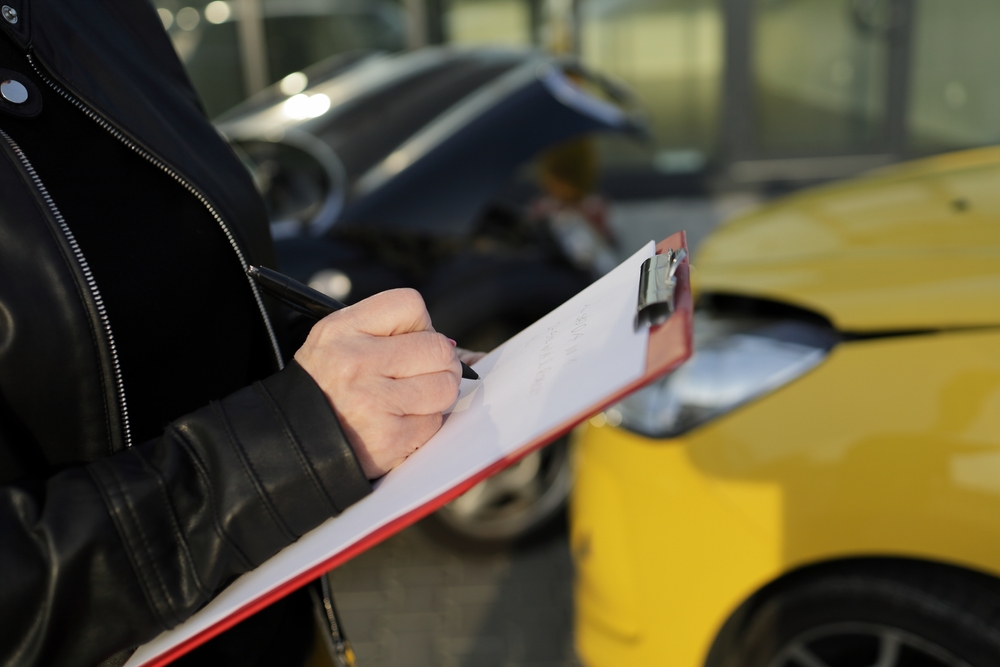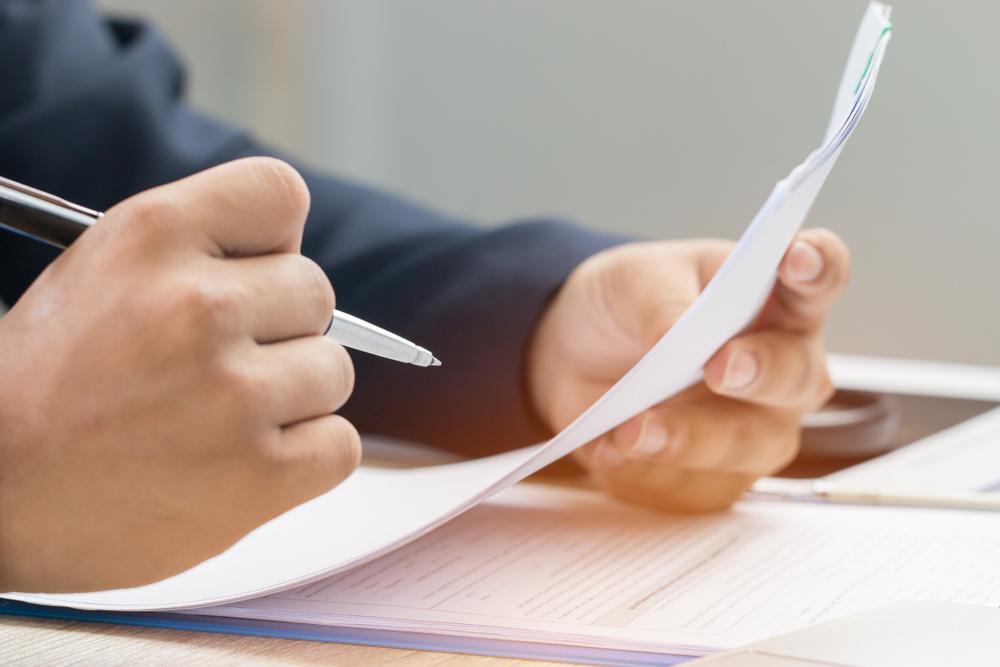Driving a company car comes with its advantages. Not only does it save you from fuel costs, but it also spares your vehicle from additional mileage and wear.
However, an accident in a company-owned vehicle introduces complexity to the situation. Whether it's a minor scrape or a significant crash, the question of financial responsibility arises: Will you be responsible, or does your employer's insurance coverage take over? The answer often hinges on whether you performed job-related duties at the time of the incident.
An Atlantic City car accident lawyer can equip you with the knowledge and steps necessary to manage such accidents.
Get A Free Consultation Today!
When Are Employers Liable for Accidents in Company Vehicles?
The legal doctrine known as "respondeat superior" often determines liability for company vehicle accidents: "respondeat superior" or "vicarious liability." Vicarious liability holds employers accountable for their employees' actions—or inactions—provided these occur within the scope of their employment.
To establish an employer's liability under vicarious liability, you must meet two primary conditions:
- The employee was acting within the scope of their duties: They were performing tasks related to their job or carrying out the employer's business. For instance, if a truck driver runs a red light during their work hours and causes an accident, the employer can be held liable because the driver was executing job-related duties at the time.
- The employee was not committing a crime: The actions taken by the employee must be lawful. If the employee engaged in illegal activities during the accident, vicarious liability might not apply.
For an act to fall within the "course of employment," it must be either directly authorized by the employer or so closely related to an authorized act that it falls under the employer's responsibility. This broad interpretation aims to protect individuals injured by employees acting within their professional capacities.
The Role of Insurance in Vicarious Liability
Another aspect to consider is the type of insurance coverage an employer carries.

Many organizations have comprehensive collision coverage that extends to employees driving company vehicles. This coverage can provide significant financial protection in the event of an accident. However, policies and coverage limits can vary and, in some cases, might not cover all situations or all employees.
Employees who regularly drive company vehicles should proactively discuss their employer's insurance policy details. Understanding whether the policy covers accidents while performing job duties and to what extent can provide peace of mind and clarity on what steps to take if an accident occurs.
How Does Criminal Activity Affect Liability in Company Car Accidents?
Imagine an employee authorized to use a company car for business purposes engages in criminal activity leading to an accident. For instance, a salesperson is allowed to use the company's luxury vehicle for client meetings and decides to impress a significant client with an extravagant dinner, indulging in several bottles of wine. On the way back, driving under the influence, the salesperson crashes into a parked motorcycle, causing damage and sustaining personal injury.
The Intersection of Criminal Activities and Employment Duties
Driving under the influence constitutes a clear deviation from any job-related duties and crosses into criminal behavior. In such cases, the principle of vicarious liability, which typically holds employers accountable for their employees' actions within the scope of their employment, reaches a limit. Committing a crime, such as driving while intoxicated, unequivocally falls outside the bounds of employment duties, presenting a significant complication in determining liability.
Employer's Refusal to Indemnify
Given the criminal nature of the employee's actions, the employer has solid ground to refuse indemnification for damages caused during the incident. This refusal arises from the premise that the employee was not acting within the scope of their employment but instead engaging in illegal activities. Consequently, claims against the employer's insurance or through workers' compensation insurance for injuries or damages incurred are likely to be denied.
Determining Scope of Employment
While the involvement in criminal activities provides a clear delineation in most cases, determining what constitutes the scope of employment can still be complicated and nuanced. Several factors come into play, including the employee's intent, the nature of the job, and whether the act could reasonably be considered part of the job activities. Legal precedents and interpretations can vary, leading to different outcomes in similar situations.
What Are the Risks of Using Company Vehicles for Personal Errands?
Before you consider using your employer's vehicle for a quick personal errand—during your lunch break or after hours—pause to understand the potential implications. Engaging in personal activities with a company vehicle without the explicit permission of your employer can lead to significant legal and financial consequences, particularly if an accident occurs during such a "frolic."
Understanding "Frolic" and Its Consequences
The term "frolic" refers to instances where employees use a company vehicle for personal reasons, completely detached from their duties. This deviation from work-related activities places the employee outside the protective umbrella of vicarious liability, meaning the employer may not be held responsible for any resulting damages or injuries. Essentially, when an employee is on a spree, they act independently of their employer's interests and instructions.
The Fine Line Between Work and Personal Use
It's important to distinguish between performing work-related tasks and venturing into personal territory with a company vehicle. While running a work-related errand is typically covered under an employer's insurance policy, deviating from these tasks for personal gain or interest significantly alters the liability landscape. In an accident, the distinction between being on a work errand and a personal detour can determine who is financially responsible for the damages.
Employer Policies and Employee Liability
Most organizations have clear policies regarding the use of company vehicles, including what constitutes authorized versus unauthorized use. To avoid unintended breaches of policy, employees should familiarize themselves with these guidelines. Ignorance of these rules does not exempt one from liability, and the consequences of unauthorized use can be severe, including personal liability for any damages incurred during the spree.
Suppose an accident happens while an employee uses a company vehicle for personal errands. In that case, the employee may find themselves solely responsible for any damages or injuries caused, facing potential legal action without the support of their employer's insurance. This situation underscores the importance of adhering strictly to company policies and contacting a car accident lawyer if there are any issues related to using company property.
How Does Law Enforcement Influence Liability Insurance in a Car Accident?
When involved in a car accident, one of the first steps you should consider is contacting law enforcement. Law enforcement officers' role at an accident scene is multifaceted. Not only do they provide immediate assistance and ensure the safety of all parties involved, but they also play a role in the aftermath of the incident, particularly concerning liability insurance claims.
The Role of Law Enforcement in Accident Reporting
Law enforcement officers dispatched to the scene of a car accident are responsible for assessing the situation, providing necessary aid, and compiling an official accident report. This report is a document that records the details of the incident, including the date, time, location, parties involved, and a narrative of how the accident occurred. It may also contain the officer's observations and any citations issued for violations of traffic laws.
Determining Fault with Law Enforcement's Help

One of the key reasons law enforcement's involvement is important is their role in determining fault. While the ultimate decision on liability rests with insurance companies, the police report is an important piece of evidence. Officers use their training and experience to assess the scene, examine the positions and conditions of vehicles, interview witnesses, and apply relevant traffic laws to determine contributing factors to the accident.
Insurance companies rely heavily on police reports to guide their investigations. The report's details help insurers determine which party's liability insurance should cover the damages. In cases where the fault is clear and supported by a police report, the claims process can be more straightforward, potentially leading to quicker resolutions for all parties involved.
The Impact on Liability Insurance Claims
The presence of a detailed police report can significantly impact the outcome of liability insurance claims. For the party deemed not at fault, a clear police report supporting their account can expedite the claim process, helping them receive compensation for damages and injuries more efficiently. Conversely, for the at-fault party, the report provides a clear account of their role in the incident, which their insurance company will use to assess and fulfill any claims made against their policy.
If there are any issues regarding liability, you should contact a car accident or workers' compensation lawyer for more details.
The Importance of Cooperation
Cooperating with law enforcement at the scene of an accident is not only a legal obligation but also beneficial for the involved parties. Providing accurate information and respecting the investigative process can aid in accurately determining fault, which is essential for the subsequent insurance claims process.
Additionally, individuals involved in the accident should obtain a copy of the police report, as it will be required when filing a claim with their insurance company.
Medical Bills: Who Pays?
The responsibility for covering medical bills after an accident can vary based on several factors:
- If the accident occurred while performing work-related duties in a company vehicle, your employer's workers' compensation insurance might cover your medical expenses.
- If another party's negligence caused the accident, their liability insurance might be responsible for your medical costs.
Given the complexity of accident law and insurance policies, consulting with a car accident lawyer is advisable if you have questions or face challenges in covering your medical bills.
Filing a Car Accident Claim
When involved in an accident with a company vehicle, filing a car accident claim with the insurance company becomes necessary. Be prepared for the company's insurance adjuster to thoroughly review your claim. Having a car accident lawyer guide you through this process can be instrumental in ensuring you receive fair compensation.
Understanding Auto Insurance in Company Vehicle Accidents

The company's auto insurance typically provides primary coverage in the event of an accident in a company vehicle. However, suppose you're using your vehicle for work and getting into an accident. In that case, your auto insurance may serve as the primary coverage, depending on the specific circumstances and insurance policies in place.
Dealing With Insurance Adjusters
After an accident involving a company vehicle, you will likely interact with an insurance adjuster who investigates the accident, assesses the damage, and determines the insurance company's payout. Remember, the adjuster's primary goal is to minimize the insurance company's financial liability. Approach these interactions with caution, and consider seeking legal advice from a car accident attorney to handle these discussions effectively.
Compensation for Personal Injury and Pain and Suffering
Suppose you suffered an injury in a company vehicle. In that case, you may be eligible for compensation for personal injury, lost income, and pain and suffering, depending on the specifics of the company's insurance policy. These benefits can cover a range of outcomes, from physical injuries and mental distress to other related medical expenses and the impact on your quality of life.
Determining the At-Fault Driver
Identifying the at-fault driver in a company vehicle accident can be difficult. If the employee acted within their employment scope, the employer might bear responsibility. However, if the employee was on a frolic or committing a crime, they might be considered at fault.
Statute of Limitations
It's important to be aware of the statute of limitations for filing a lawsuit related to an accident. This time frame varies by state, and failing to initiate legal action within this period can result in losing your right to sue.
Workers' Compensation and Independent Contractors
Workers' compensation may benefit employees injured while driving a company vehicle for work purposes. However, these benefits typically do not cover accidents during personal errands or criminal activities. The liability may differ for independent contractors, and whether the company is responsible depends on the nature of the contracted work and the specifics of the accident.
Contact a Car Accident Attorney Regarding Crashes Involving Company Vehicles
Accidents involving company vehicles require careful handling due to the additional layers involving employment and commercial insurance issues. By taking the right steps immediately after the accident and seeking the right legal assistance from a car accident lawyer, you can ensure that your rights are protected and that you're positioned as favorably as possible throughout the process.
Remember, you're not alone in this. A car accident attorney can provide guidance, advocate, and ensure you receive the fair treatment and compensation you deserve. If you are in this situation, please don't hesitate to ask for assistance.
